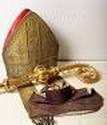The Sacramental Life: Ordination
God calls all people into a spiritual relationship and gives us particular gifts with which to live our lives as Christians. We use the word "ministry" to describe our response to God's call to live a certain way and do particular things. Everyone has a ministry because everyone is called in one form or another.
In the Episcopal Church, some are called to a special ministry within the church to train, equip and empower Christians to be effective. There are three types, or Orders, of these specially-called ministers, each with a different function within the leadership of the church. The three Orders are Bishops, Priests, and Deacons. Ordination is the ritual that makes a person into one of these three. Bishops serve as the signs of the unity of the church, being the link between the local church (the diocese) and the wider church throughout the world. Bishops are the guardians of the church's doctrine, the faith once delivered to the saints, and are the chief pastors, liturgists, canon lawyers, and administrators of the diocese. Priests serve as representatives of the bishop within the parish churches. Their primary role is to care for the spiritual lives of the members of the congregation, by teaching, proclaiming the gospel, administering the sacraments, leading worship, preaching, blessing and pardoning and caring for the members of the church. Deacons serve as assistants to the bishop, providing a vital link between the church and the many needs of the world around us. They often inspire and lead members of the church to mission work in the community, and are heralds of the poor, the marginalized, and the forgotten. The ordination process is open to anyone who senses a call from God to serve in these ministries. It involves several years of discernment, of exploration and questioning and prayer with the help and guidance of people who have the gifts for helping people in this process. The path to ordination involves self-examination and conversation and reflection, and typically also three years of training at one of our seminaries to learn the skills required for ministry. |